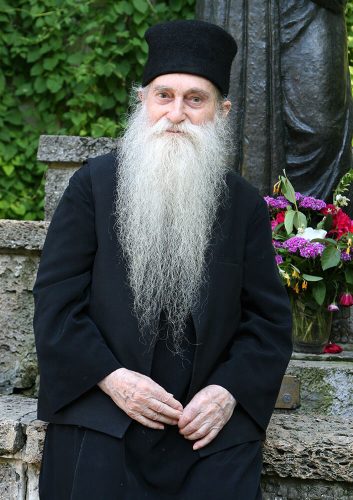
Luna septembrie a deschis un nou șir al serilor duhovnicești, care conturează chipul evanghelic al creștinului, accentuând trăsături pe care Mântuitorul ar vrea ca noi să ni le însușim, transmise prin intermediul învățăturilor și parabolelor Sale.
O primă trăsătură este eroismul. Eroismul care se cere de la creștini, este mai ales cel definit de părintele Arsenie Papacioc: „Luptător este cel căruia îi place lupta. Erou este cel care se biruie pe sine.” Nu există urmare a lui Hristos fără acest tip de eroism. Urmarea lui Hristos implică biruirea de sine. Iar biruirea de sine cere mult eroism!
În cuvântul Mântuitorului, vedem adesea îndemnuri care implică eroismul. „Oricine voiește să vină după Mine să se lepede de sine, să-și ia crucea și să-Mi urmeze Mie. Căci cine va voi să-și scape sufletul îl va pierde, iar cine va pierde sufletul Său pentru Mine și pentru Evanghelie, acela îl va scăpa” (Marcu 8, 34-35). Eroismul se cuprinde mai ales în aceasta, „să se lepede de sine”. Adică, a sta eu împotriva voii mele, a mofturilor, părerilor, logicii mele și a tot ce am al meu. Iar acest model de eroism, îl vedem în lume, cu precădere la mame. Așa cum ele se leapădă de sine pentru dragul copilului, așa și noi trebuie să o facem de dragul lui Dumnezeu. Însă, el nu poate fi aplicat decât cu ajutorul Mântuitorului.
Sfinții Apostoli au avut la rândul lor nevoie de mult eroism pentru a-L urma pe Mântuitorul: „Și chemând pe apostoli și bătându-i, le-au poruncit să nu mai vorbească în numele lui Iisus, și le-au dat drumul. Iar ei au plecat din fața sinedriului, bucurându-se că s-au învrednicit, pentru numele Lui, să sufere ocară. Și toată ziua, în templu și prin case, nu încetau să învețe și să binevestească pe Hristos Iisus” (Faptele Apostolilor 4, 18-19). Așadar, și sfinții au avut nevoie de mult eroism pentru a urma chemarea lui Hristos.
Vedem multă lepădare de sine la Sfântul Pavel, care exclamă: „Eu pe toate le socotesc că sunt pagubă, față de înălțimea cunoașterii lui Hristos Iisus, Domnul meu, pentru Care m-am lipsit de toate și le privesc drept gunoaie, ca pe Hristos să dobândesc” (Filipeni 3, 4-8). Aceasta este o atitudine eroică. Atunci când înțelege omul că totul este cuprins de moarte, că nimic nu-l mântuiește și că Hristos este Mântuitorul, că e dulce și mă încredințează că îl pot urma, atunci pornesc cu eroism spre El și las totul în urmă. Iar lepădarea este urmată de țâșnirea către Hristos, cum spune Sfântul Pavel în continuare: „Uitând cele ce sunt în urma mea, și tinzând către cele dinainte, alerg la țintă, la răsplata chemării de sus, a lui Dumnezeu, întru Hristos Iisus” (Filipeni 3, 12-14).
Atribuită erosimului este și mulțumirea, slăvirea lui Dumnezeu indiferent de situația în care ne aflăm. Părintele Zaharia Zaharou ne învață: „Aducerea de mulțumită este o scurtătură plină de putere în viața duhovnicească. Dacă omul nu începe să își plângă de milă atunci când viața sa se asemuie iadului, ci dă mulțumită lui Dumnezeu, Îl va întâlni pe Cel ce S-a pogorât în străfundul iadului pentru mântuirea sa.”
O altă manifestare a eroismului este noblețea. Sfântul Paisie Aghioritul o descrie foarte frumos: „Noblețea duhovnicească este superioritatea duhovnicească, este jertfă. Un suflet nobil are pretenții numai de la sine însuși, iar nu de la ceilalți. Se jertfește pentru ceilalți, fără să aștepte răsplată. Uită tot ce dă, dar își amintește până și cel mai mic lucru care i se dă. Are mărinimie, are smerenie și simplitate, are lipsă de interes, cinste… le are pe toate. Are cea mai mare bucurie și veselie duhovnicească.” „Noblețea duhovnicească are Harul lui Dumnezeu, este – cum să spun? – o însușire dumnezeiască. Acolo unde există noblețe, lucrarea nu se face cu zgomot, nu se face la vedere. De aceea, acolo Se odihnește Hristos și acolo este binecuvântarea lui Hristos.” Și tot sfântul ne explică cum să o dobândim: „Să te miști smerit, cu râvnă curată și întotdeauna să te jertfești. Să cultivi sensibilitatea duhovnicească. Să rămâi netulburat(ă) când altul te deranjează și să te bucuri că ești deranjat(ă) și că nu deranjezi.”
Eroismul poate fi pus în practică doar dacă avem parte și de mângâierea dumnezeiască. Părintele Zaharia Zaharou spune: „Avem nevoie de mângâiere de sus pentru a lucra și împlini cele două mari porunci. Mângâierea de sus biruiește orice ispită, deoarece atunci când ne atinge sufletul, simțim grija plină de gingășie și dragostea lui Dumnezeu. Problema este cum să ne smerim pe noi înșine. Cu cât mai smerit ne apropiem de El, cu atât mai îmbelșugată va fi mângâierea pe care o vom primi. Însă nu ne apropiem de Dumnezeu cu scopul de a fi mângâiați; ne apropiem de El pentru ca să ne îndrepteze viața și să ne ridice din sărăcia noastră duhovnicească.”
